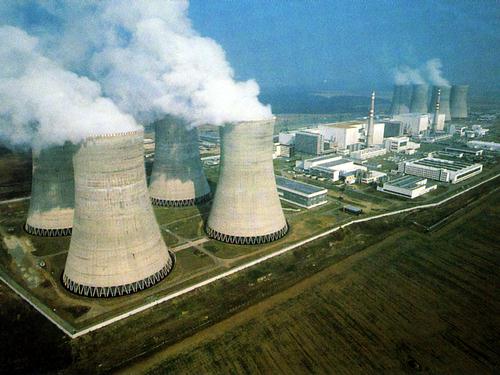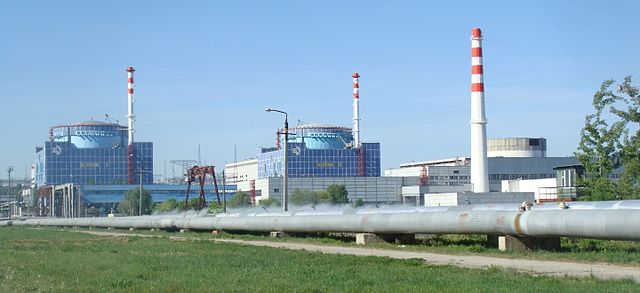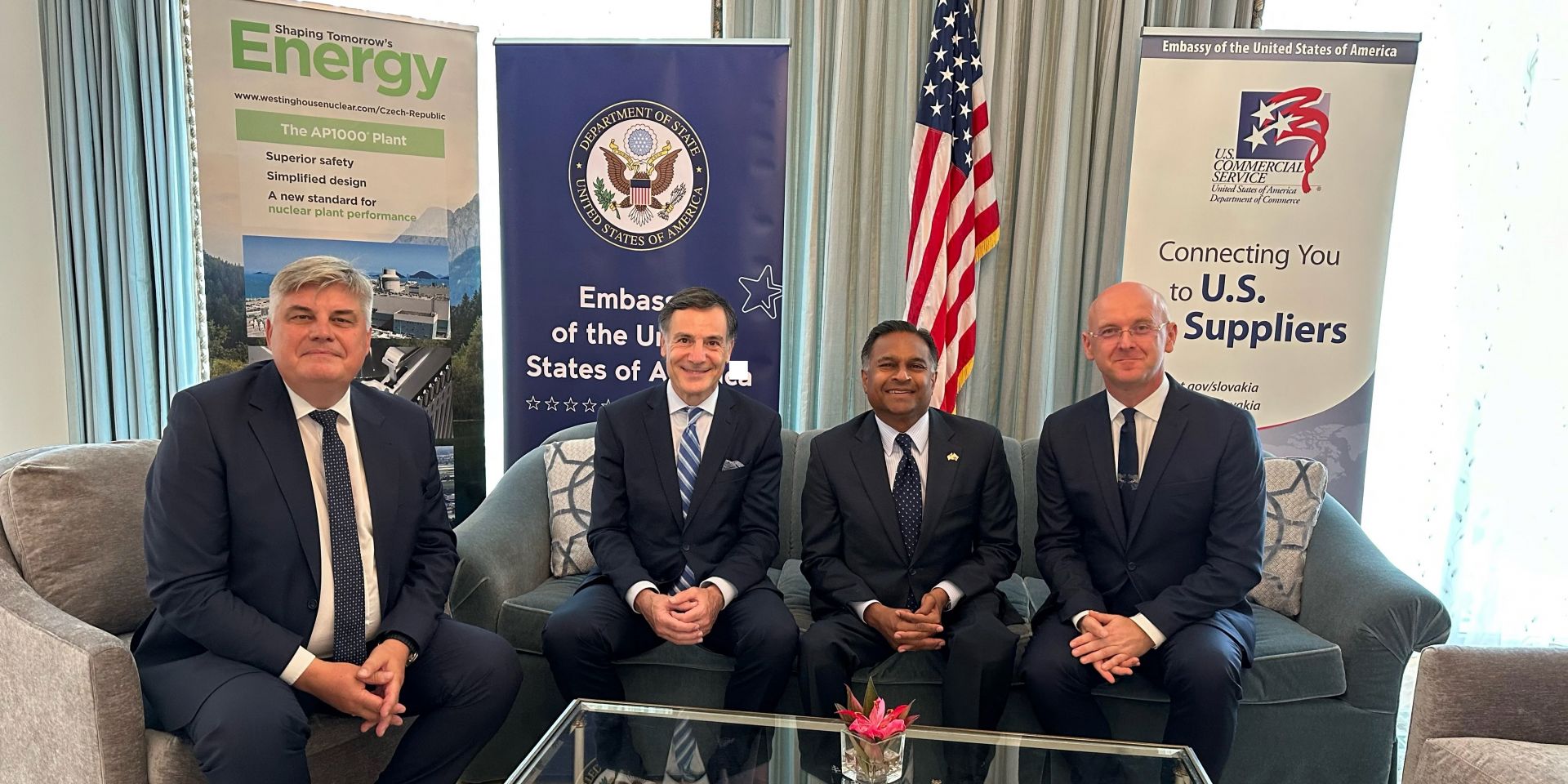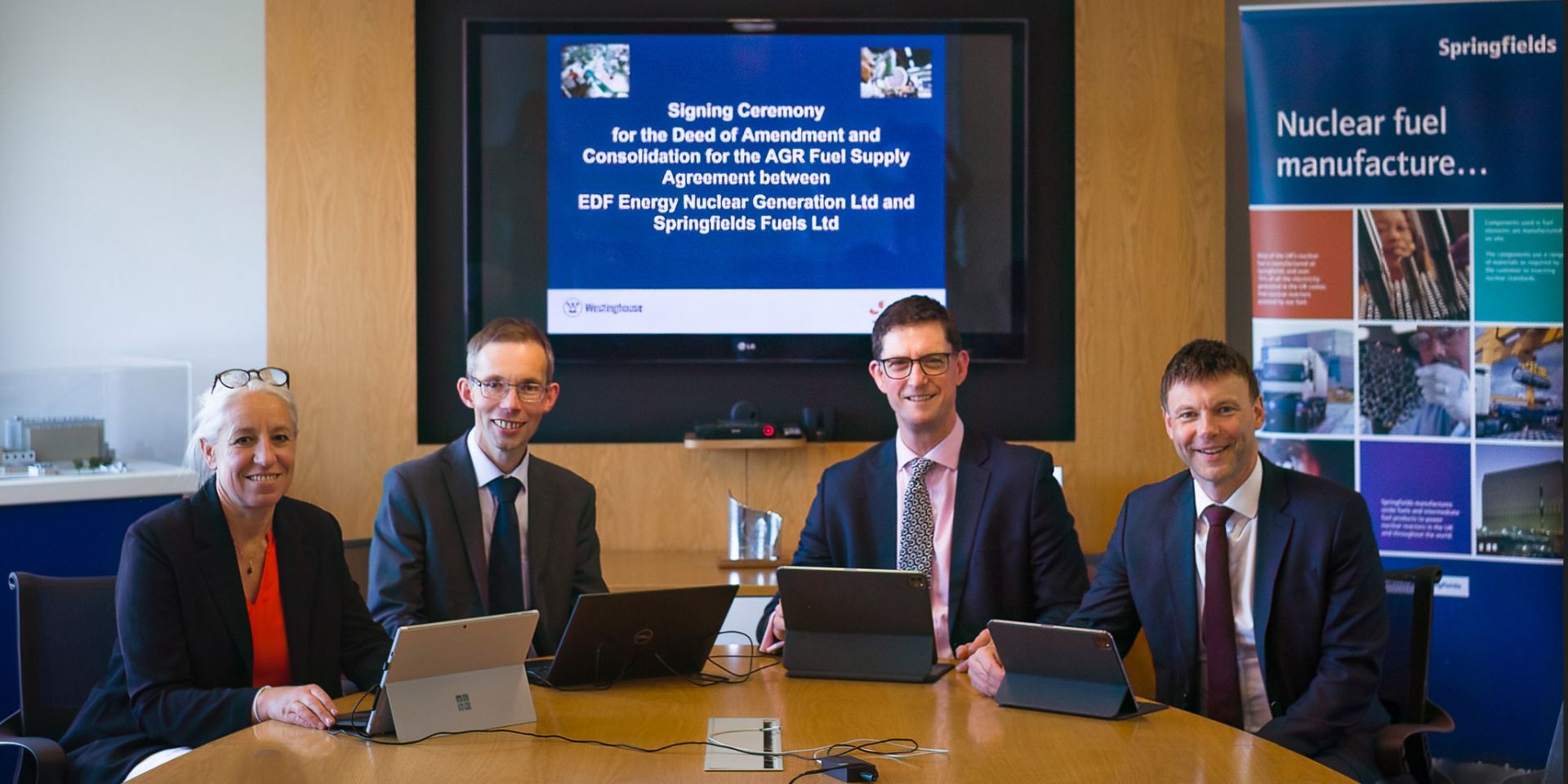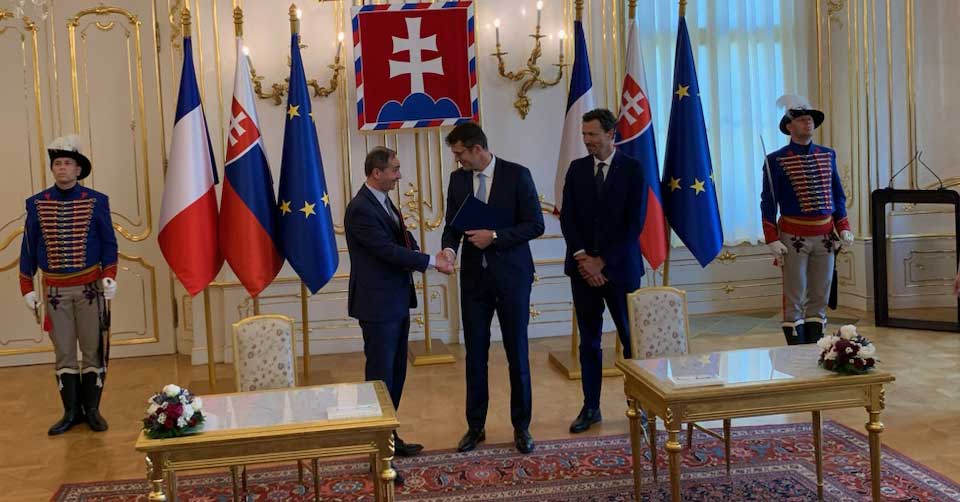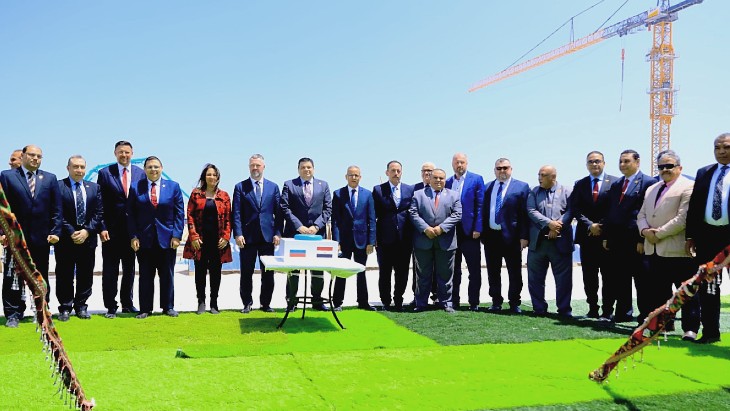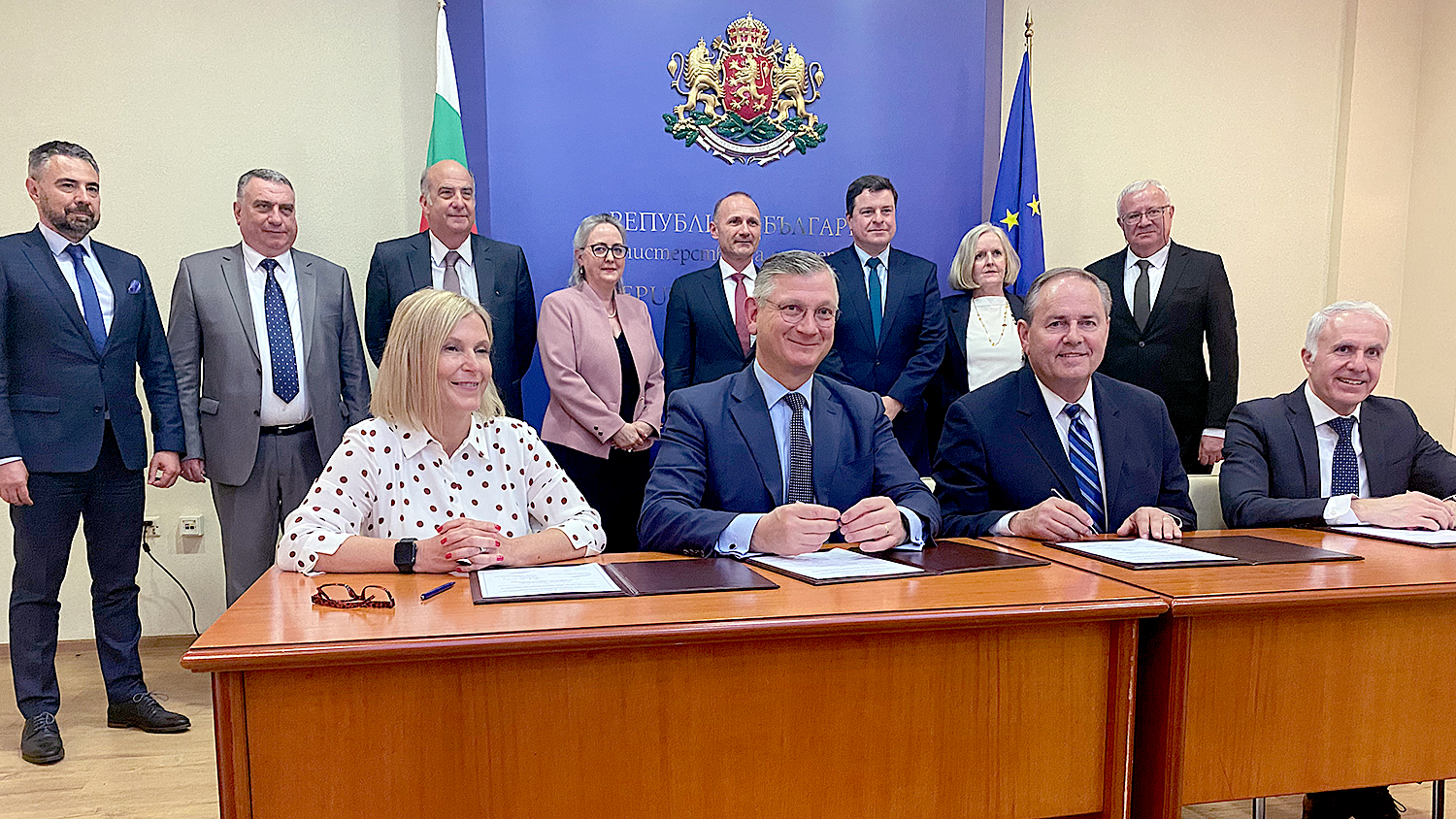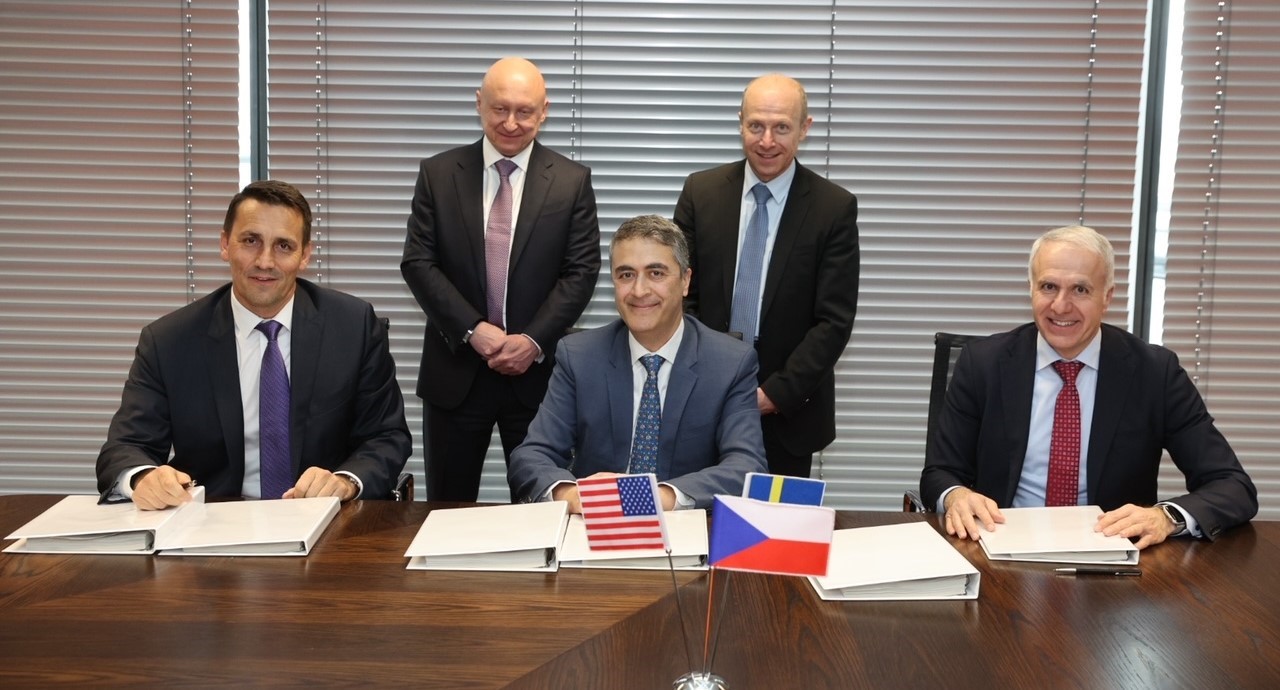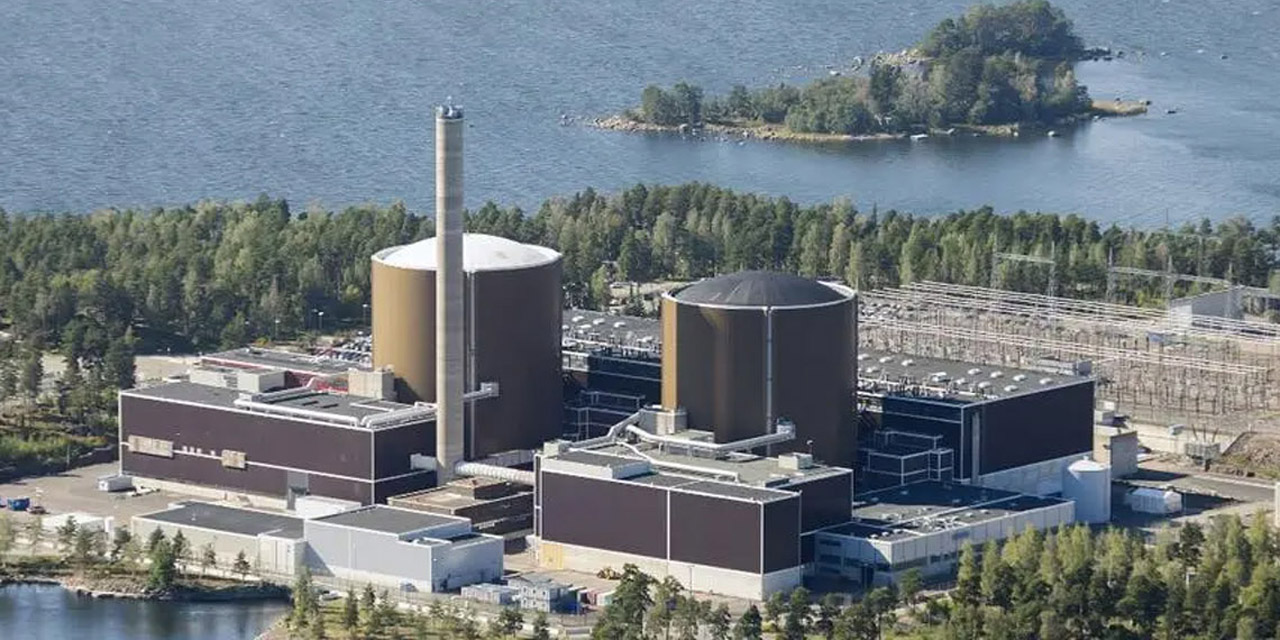The Belarusian nuclear plant. (Photo: Rosatom)
The second of the two VVER-1200 pressurized water reactors at Belarusian, the sole nuclear power plant in Belarus, has entered commercial operation, Russia’s state-owned atomic energy corporation Rosatom announced last week.
The Dukovany nuclear power plant. (Photo: INSP)
Elektrárna Dukovany II (EDU II), a subsidiary of Czech utility ČEZ, has received final bids for the construction of a fifth reactor at the Dukovany plant, as well as nonbinding bids for three additional units to be sited at Dukovany and at Temelín, the Czech Republic’s other nuclear power facility. (Dukovany currently houses four Russian VVER-440/V213 pressurized water reactors, while Temelín is home to two VVER-1000/V320s.)
Khmelnytskyi nuclear power plant in Ukraine. (Photo: Wikimedia)
Explosions near the Khmelnytskyi nuclear power plant in western Ukraine early Wednesday shattered windows at the facility and temporarily cut off power to some off-site radiation monitoring stations, the International Atomic Energy Agency reported on October 25.
Slovakia’s Mochovce nuclear plant, located about 62 miles east of Bratislava, the nation’s capital. (Photo: Slovenské Elektrárne)
The Unit 3 reactor at Slovakia’s Mochovce nuclear power facility has completed the commissioning process, becoming a full-fledged member of the country’s nuclear fleet, plant owner Slovenské Elektrárne has announced.
Framatome CEO Bernard Fontana (left) shakes hands with Hungarian energy minister Csaba Lantos. (Photo: Framatome)
France-based Framatome and the Hungary’s Ministry of Energy agreed this week to strengthen their relationship in the field of nuclear energy, including in such areas as fuel supply, education, research and development, implementation of new technologies, and long-term operation.
The front end of the fuel cycle is getting a lot of attention lately—and it needs it. The war in Ukraine has disrupted the global supply chain for many products, nuclear fuel being one. Several countries have determined that they no longer want to rely on nuclear fuel from Russia. This can be anything from fabricated fuel including uranium, conversion, and enrichment to just enrichment.
Since the Cold War, Russia has been a major supplier of nuclear fuel to the West. Replacing Russia as the main supplier will take both time and money—a fact that has become even more clear as the small modular reactor community grows, and with it, the demand for high-assay low-enriched uranium (HALEU) for fuel.
The American Nuclear Society has been highlighting the immediacy of the fuel supply problem—which will become a crisis without immediate action—for years. In 2021, ANS wrote to Congress, urging swift action. This year, Nuclear News and ANS’s Nuclear Newswire have run a three-part series by energy writer and consultant Matt Wald on the domestic nuclear fuel shortage. The first article, “On the verge of a crisis: The U.S. nuclear fuel Gordian knot,” was published on Newswire on April 14; the second, “The U.S. nuclear fuel Gordian knot: From global supplier to vulnerable customer,” on May 19. The final piece of the series, “The U.S. nuclear fuel Gordian knot: The uncertain path forward,” was posted on September 1.

Pavol Štuller, JAVYS chairman and chief executive officer, on the left, and Vakisasai Ramany, EDF senior vice president in charge of new nuclear development, sign an agreement in Paris.
Slovakia’s state-owned nuclear company JAVYS has announced the signing of a framework cooperation agreement (FCA) with France’s EDF for further cooperation “in the field of nuclear energy and in the implementation of projects aimed at development of large power reactors and small modular reactors.” Currently, the Slovakian nuclear fleet consists of two VVER-440/V213 pressurized water reactors at Bohunice, and two at Mochovce (with two more units on their way).
The signing took place on August 25 during an official visit to Paris by Slovakia’s minister of economy Peter Dovhun.
Executives from Westinghouse and Slovenské Elektrárne met in the Slovakian capital of Bratislava to sign the agreement to license and supply VVER-440 fuel assemblies. From left are Aziz Dag, senior vice president and managing director of Westinghouse Electric Sweden; Lukáš Maršálek, deputy director for the accounting, finance, and control department of Slovenské Elektrárne; Tarik Choho, Westinghouse president of nuclear fuel; and Branislav Strýček, director general of Slovenske Elektrárne. (Photo: Westinghouse)
In the latest example of Europe’s move away from its dependence on Russia for VVER reactor fuel, Westinghouse Electric Company on Friday signed a long-term agreement with Slovakia’s nuclear power plant operator, Slovenské Elektrárne, to license and supply VVER-440 fuel assemblies.
From left: Petr Brzezina, president, Westinghouse Czech Republic and Slovakia; Elias Gedeon, senior vice president, Westinghouse commercial operations; Gautam Rana, U.S. ambassador to Slovakia; and Pavol Štuller, chairman of the board and chief executive officer, JAVYS. (Photo: Westinghouse)
Westinghouse Electric Company yesterday announced the signing of two memorandums of understanding with Slovakia’s state-owned nuclear company JAVYS regarding the potential deployment of the U.S. firm’s AP1000 reactors and AP300 small modular reactors.
The European Union has selected a Westinghouse-led consortium to develop and deliver “a secure, fully European nuclear fuel supply” for Russian-designed VVER reactors in the EU and Ukraine, the U.S.-based firm announced last week.
From left, Sophie Lemaire, Westinghouse senior vice president, EMEA & Asia PWR fuel; David Eaves, Westinghouse EHS&Q director and chief technical officer; Mark Hartley, EDF Energy managing director of generation; and David Tomblin, EDF Energy finance director of generation. (Photo: Westinghouse)
Westinghouse Electric Company has signed a contract extension with EDF Energy to supply fuel for the United Kingdom’s advanced gas-cooled reactor (AGR) fleet, the American firm announced yesterday.
The Rivne nuclear power plant, with Units 1 and 2 in the foreground. (Photo: Westinghouse)
Westinghouse Electric Company this week inked agreements with two of its European customers—Ukraine reactor fleet operator Energoatom and Bulgaria’s Kozloduy NPP–Newbuild, a firm established in 2012 to commission new nuclear power capacity at Kozloduy, Bulgaria’s only nuclear power facility.
From left, Framatome’s CEO Bernard Fontana shakes hands with Slovenské Elektrárne’s CEO Branislav Strýček following the signing of an MOU. Also pictured is first vice chairman of Slovenské Elektrárne’s board of directors, Michele Bologna.
Slovakia’s Slovenské Elektrárne—operator of the nation’s two nuclear power plants, Bohunice and Mochovce—and France’s Framatome have signed a memorandum of understanding for the development of a global strategic relationship, the companies announced last week.
Egyptian and Russian officials inaugurate construction of El Dabaa-3 on May 3. (Photo: Nuclear Power Plants Authority)
The main construction phase for Unit 3 at Egypt’s El Dabaa nuclear power plant project has begun, Russia’s state-owned nuclear energy corporation Rosatom announced last week.
Various officials (back row) look on at the fuel supply contract signing in Sofia, Bulgaria. Front row, from left: Angie Darkey, Uranium Asset Management’s managing director; Boris Schucht, Urenco CEO; Tim Gitzel, Cameco president and CEO; and Aziz Dag, Westinghouse senior vice president of global BWR & VVER fuel business.
Canada’s Cameco and U.K.-based Urenco last week jointly announced the signing of agreements to become part of a Westinghouse-led fuel supply chain for Bulgaria’s Kozloduy nuclear power plant. (Also included in the partnership is Uranium Asset Management.)
Bohdan Zronek, ČEZ board member and director of the firm’s nuclear energy division; Tarik Choho, president of Westinghouse’s nuclear fuel division; and Aziz Dag, senior vice president of BWR and VVER fuel for Westinghouse (seated, left to right) signed the agreement. Also present were David Benes, ČEZ Group CEO, and Patrick Fragman, Westinghouse CEO. (Photo: Westinghouse)
Westinghouse has signed an agreement with ČEZ, owner and operator of the Czech Republic’s nuclear power plants, to supply VVER-440 fuel assemblies to the Dukovany facility, the American firm announced March 29. Fuel deliveries will commence in 2024, replacing Russia’s TVEL fuel, with an anticipated term of seven years. One of the Czech Republic’s two nuclear power plants, Dukovany houses four Russian-supplied VVER-440/V213 reactors.
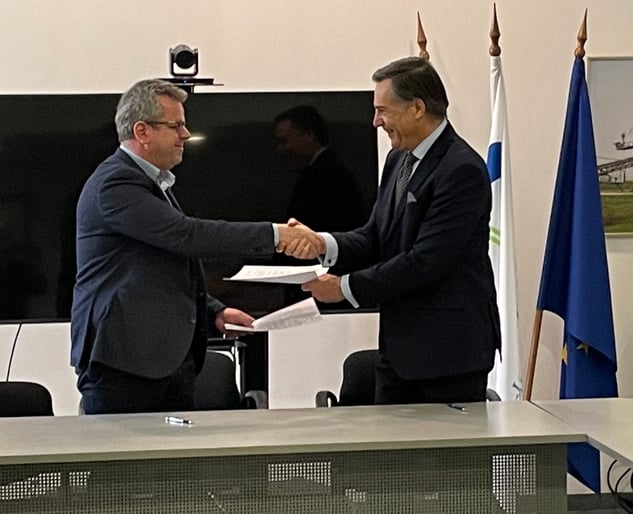
Ivaylo Ivanov (left), member of Kozloduy NPP-Newbuilds’ board of directors, and Elias Gedeon, senior vice president for Westinghouse Energy Systems, complete the signing of an MOU for Westinghouse AP1000 technology. (Photo: Westinghouse)
Continuing to move forward with its ambitions in Central and Eastern Europe, Westinghouse Electric Company last week signed a memorandum of understanding with Kozloduy NPP–Newbuilds (KNPP-NB), establishing a working group to initiate planning for the potential deployment of one or more of the American company’s AP1000 reactors at Bulgaria’s Kozloduy nuclear power plant.
KNPP-NB was established in 2012 to commission new nuclear power capacity at Kozloduy.
The working group, according to a March 2 Westinghouse announcement, will also evaluate regulatory, licensing, and design bases to ensure compliance with applicable regulations, as well as a streamlined execution path to enable Bulgaria to achieve its nuclear energy goals.
The Loviisa nuclear power plant. (Photo: Fortum)
The Finnish government on February 16 granted a new operating license to Fortum Power and Heat Oy for its two Loviisa reactors—twin 507-MWe VVER-440/V213 units—providing them with an additional 20 years of operational life.
Westinghouse Electric and Framatome have signed agreements with Kozloduy NPP—the eponymous operator of Bulgaria’s only nuclear power facility—to fabricate and deliver fuel for the site’s two operating reactors. Westinghouse will provide the fuel for Unit 5 under a 10-year contract inked on December 22, while Framatome will supply Unit 6 under a December 30 preliminary deal. First deliveries of fuel from Westinghouse and Framatome are expected in 2024 and 2025, respectively.
The two agreements, according to the Bulgarian News Agency, “are part of an effort to diversify energy supplies to Bulgaria and do away with the country’s dependence on Russian energy resources.” In November, the Bulgarian National Assembly approved 156–47 a resolution tasking the country’s Council of Ministers with licensing non-Russian nuclear fuel for Kozloduy.
Finnish energy company Fortum has announced the launch of a two-year feasibility study to explore the potential for new nuclear construction, with a focus on Finland and neighboring Sweden. The utility said it will examine commercial, technological, and societal conditions for both conventional large reactors and small modular reactors.



